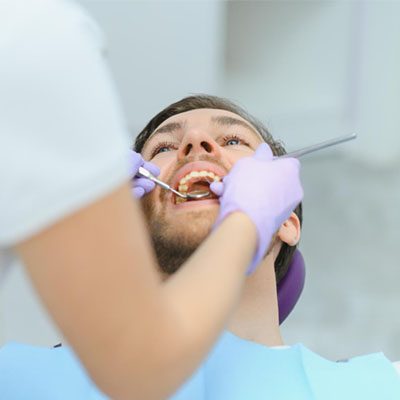Wisdom Teeth Extractions
Wisdom Teeth Extractions Thornton
 A person’s wisdom teeth are a recurring rite of passage in everyday life. At Thornton Dental, we bring the treatment plan as close to comfortable and as painless as possible by utilising the latest tools and procedures to enable you to recover quickly.
A person’s wisdom teeth are a recurring rite of passage in everyday life. At Thornton Dental, we bring the treatment plan as close to comfortable and as painless as possible by utilising the latest tools and procedures to enable you to recover quickly.
Wisdom teeth, or third molars, are large teeth at the back of your mouth that come through your gums last. People experience them in their late teens up to their mid-twenties, although some do not get them, and others experience them much later. There are many reasons why a wisdom tooth must be removed. It could be due to crowding, trauma, severe decay, or infection. The tooth can be trapped below the gum tissue by other teeth or bone. This is then referred to as an “impacted wisdom tooth.”
It may become painful, swollen, and tender if the wisdom teeth become impacted. Extraction may be recommended if the wisdom tooth causes pain or other issues.
Four Types of Impaction
- Mesioangular: This is the most common form of impaction, occurring 44% of the time. A tooth has developed at an angle, which pushes the rest of the teeth forward.
- Vertical: this happens when the third molars can’t break through the gum line
- Distoangular: the impaction is recognised as distoangular if the tooth is angled backwards.
- Horizontal: if horizontal impaction occurs, the wisdom tooth has grown at a 90-degree angle, approaching the second molars’ roots.
Problems Caused By Impacted Wisdom Teeth
- Swelling or sore gums
- Tender gums
- Intense tooth pain
- Difficulties in opening the mouth
- Complications in chewing food and swallowing
- Pus from the gum
- Fever
The Importance of Wisdom Tooth Removal
In most cases, third molars are extracted if they are impacted. Infection can develop if impacted wisdom teeth are not removed. In addition, you are likely to experience pain, discomfort, swelling, stiffness in the jaw, and other general feelings. The position of impacted wisdom teeth inside the mouth makes them difficult to clean.
Teeth that are partly covered and have issues with eruption are at risk of debris building up and the danger of possible infection. If you ignore treatment, symptoms including discomfort, redness, bad breath, problems opening your jaw, and other disorders linked to wisdom teeth can worsen and lead to infection.
Smoking and Wisdom Tooth Complications
Smoking following your wisdom teeth removal procedure can significantly affect your recovery and directly delay your healing process. The Australian Dental Association (ADA) states that smoking can also impair your sense of taste and smell and delay healing after dental procedures like tooth extractions.
Furthermore, the tar from cigarettes stains teeth, produces foul breath and can turn your tongue discoloured. Only a professional cleaning in the dentist’s office removes these stains.
Wisdom Teeth Extractions in Thornton
If you have problems with your wisdom teeth or are experiencing any of the symptoms mentioned above, you should visit a dental professional as soon as possible. Dentist Thornton, Maitland NSW, has extensive experience with impacted wisdom teeth.
Over the years, we have handled many simple and complex dental procedures. We also offer pain-free dental services to relax you during treatment.
We guarantee a same-day dental emergency appointment! Call us at (02) 4966 2996 to book your appointment today!
Risks arise from every invasive or surgical operation. Before proceeding, you are advised to get a second opinion from a duly licensed medical practitioner.
Visit us at Thornton Shopping Centre, Shop 30/1 Taylor Ave in Thornton.
What are wisdom teeth?
The wisdom teeth usually erupt in the late teens or early twenties, the last pair of molars.
Why are wisdom teeth removed?
They are often removed to prevent overcrowding, misalignment, infections, and other dental issues.
Is wisdom teeth extraction painful?
The procedure is under anaesthesia, so you shouldn’t feel pain during extraction. During the recuperation process, you should expect some soreness and swelling.
What is the recovery time?
Recovery usually takes about a week, but it can vary. Following post-operative care instructions helps speed up healing.
What can I eat after extraction?
For a few days, limit your diet to soft foods like soup, mashed potatoes, and yogurt. Avoid firm, chewy, or hot foods.
How can I manage pain after extraction?
Over-the-counter pain relievers, prescribed medicines, and ice packs can help manage pain and swelling.
Are there any risks involved?
Complications are rare but can include infection, dry socket, or nerve damage. Following your dentist’s advice minimises these risks.
